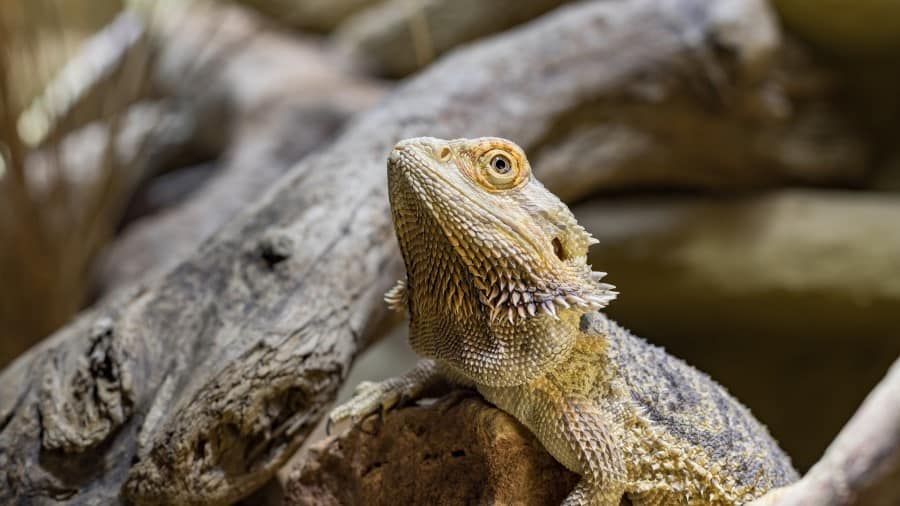
You might have seen pets like dogs or cats drool and started to wonder do bearded dragons drool as well? Well, drooling is common for some pets, just as bearded dragons. However, I am not suggesting that you should not worry at all if you see them drooling.
The most common reason for bearded dragons to drool is because they had consumed too much water. However, drooling could also indicate some health issues such as mouth rot, respiratory tract infection, and infectious stomatitis.
Do keep in mind that drooling is just one of the symptoms. If your bearded dragons drool, this doesn’t mean that they are sick and need to get a vet immediately.
After some digging, I have compiled some information about the reason behind bearded dragons drooling. Continue down this article to find out more.
Reasons for Bearded Dragons to Drool
There several reasons why bearded dragons drool. Most of the time, it fairly normal and nothing much to worry about. However, sometimes bearded dragons drool due to diseases like mouth rot, respiratory tract infection, and infectious stomatitis.
Consuming too Much Water
Whenever bearded dragons drink too much water, the excess water mixes with the saliva and discharge through their mouth. Hence, that is the reason why your bearded dragons look like they are drooling. This is normal and there should be nothing to worry about.
Mouth Rot
Bearded dragons might keep drooling due to mouth rot which isn’t normal. The saliva that keeps coming out from the bearded dragon’s mouth could be due to the swollen jaw or small hemorrhages on its gums.
Mouth rot is usually caused by small cuts around the mouth or food getting stuck between the teeth. Symptoms of mouth rot are discolored or blackened mouth together with drooling.
Respiratory Tract Infection
Respiratory tract infection could be another reason why your bearded dragon is drooling, it is caused by a bacterial infection. This is a serious health issue and treatment should be applied as soon as possible.
You can look for symptoms like drools and bubbles coming out from your bearded dragon’s mouth, sneezing, or breathing with their mouth opened.
Symptoms like rapid breathing, lack of energy, discharges from eyes and nose, weight loss due to reducing appetite should be observed as well.
Infectious Stomatitis
Bearded dragons’ drooling can also be caused by infectious stomatitis. This is one of the most common diseases among reptiles due to bacterial infections of the gums and jawbones.
If your bearded dragon is acting weird, loses appetite, or has a lack of energy, it likely has infectious stomatitis.
Other significant symptoms are swelling and inflammation together with white or grey patches around the mouth. Also, you may see bearded dragons discharge thick mucus.
What to Do When My Bearded Dragon is Drooling?
Drooling can be very normal, most of the time, just wait it out and your bearded dragon will be okay. However, if your beardie is drooling due to an infection, bring it to the vet as soon as you can.
Wait and Observe
There is nothing much to do in the case of your beardie drinking too much water. Whenever the amount of water inside the body of bearded dragons has comes to a normal level, they will stop drooling.
As long as there are no other unusual symptoms, drooling is just a biological process. With that being said, drooling should only happen for a short period.
If the drooling persists for an extended period, this should alarm the owner. Observations should be made and bring to a veterinarian as soon as possible.
Bring It to the Vet
If your bearded dragon is drooling for a prolonged period, bring it to the vet. Some common diagnoses the vet could perform are blood tests or X-rays to confirm the infection before any treatments or medicines are given.
In the case of mouth rot, vets will usually apply antiseptic or inject antibiotics into the affected area which will get rid of the bacteria.
However, if your bearded dragons are in a more severe condition, hospitalization is usually required to have a more detailed treatment.
How to Prevent Bearded Dragons from Drooling
Prevention is always better than cure. Most of the time, you can easily prevent your bearded dragon from drooling with the proper actions.
Prevent Overfeeding Water
One way to do it is by placing the water bowl for a certain period for bearded dragons to drink and remove it from the enclosure. This can effectively prevent bearded dragons from drinking too much water.
Other than that, the still water in the water bowl tends to become a breeding ground for pathogens and parasites which increases the risk of bearded dragons getting sick. This will give you a whole new set of problems which you don’t want.
Feed Proper and Clean Food
The most direct and effective way is by only feeding your bearded dragons with insects that are safe and clean to eat. This will greatly strengthen their immune system and prevent beardies from getting mouth rot, respiratory tract infection, and infectious stomatitis.
One easy trick to identify whether an insect should be feed to your bearded dragon is by making sure its size is smaller compared to the space between your bearded dragon’s eyes.
Hornworms, crickets, and silkworms are all rich in protein but low in fat which are the best choices to feed bearded dragons.
Have Proper Temperatures And Humidity
Bearded dragons should have access to two sets of temperatures, a cooler side and a warmer side (basking spot).
The proper temperature of the cooler side of the enclosure should be between 75 – 85°F during daytime and 70 – 75°F during nighttime.
However, basking spots should be kept at around 88 – 100°F. On the other hand, humidity should be kept between 20 to 40%.
With the proper temperature and humidity in the enclosure, bearded dragons are likely to have an active and stronger immune system, hence are less likely to get diseases that lead to drooling.
A reliable thermometer and hygrometer are recommended to ensure the temperature and humidity are regulated at the ideal range.
Keep the Enclosure Clean
The enclosure should also be cleaned regularly along with all the objects inside and this includes any decoration in the enclosure. The food bowl, however, should be cleaned daily to prevent bacteria from growing.
If there is a substrate, it should be replaced or cleaned every month. Having a clean enclosure will greatly reduce the chances of bacteria growing.
Hence, reduces the risk of your bearded dragon getting any diseases mentioned above that makes your beardie drool continuously.
Conclusion
In conclusion, it is common for bearded dragons to drool. If you see them drooling without any other weird behaviors or symptoms, it is very likely that they just drank too much water.
You should always pay attention to symptoms like discharge from eyes and nose lethargy, swelling around the mouth. You can easily prevent your bearded dragon from drooling due to infection by strengthening their immune system.
Just make sure that your beardie’s enclosure is properly set up and you’re feeding them the right food. Lastly, don’t hesitate to bring your bearded dragons to a veterinarian for treatment if your it’s drooling nonstop.


